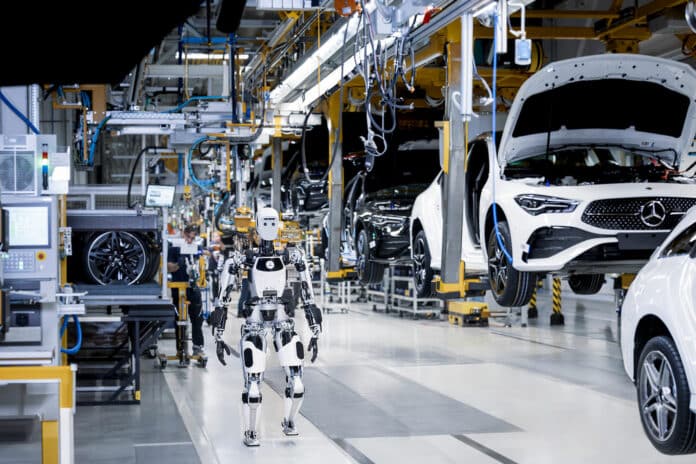Texas-based Apptronik is making strides in the field of next-generation general-purpose humanoid robots. The company has entered into an agreement with Mercedes-Benz to identify applications for highly advanced robotics in Mercedes-Benz Manufacturing.
Mercedes-Benz is always striving to provide its staff with the latest technology to ensure the highest possible quality in their work. Recently, the company has introduced the Apollo humanoid robot to their manufacturing facilities.
With its advanced capabilities, Apollo is being tested for various use cases, such as delivering parts to the production line for workers to assemble while simultaneously inspecting the components. Apollo will also be used to deliver the totes of kitted parts later in the manufacturing process.
The integration of humanoid robots into workspaces could potentially benefit various industries, such as Mercedes-Benz. Allowing for the deployment of robots that can operate efficiently in human-designed environments could help avoid costly facility redesigns solely based on accommodating robots instead of people.
By automating physically demanding, repetitive, and tedious tasks, companies can free up human workers to focus on more complex and creative work while also increasing efficiency and reducing the risk of workplace injuries.
“When we set out to build Apollo, an agreement like the one we’re announcing today with Mercedes-Benz was a dream scenario,” said Jeff Cardenas, co-founder & CEO of Apollo. “Mercedes plans to use robotics and Apollo for automating some low skill, physically challenging, manual labor – a model use case which we’ll see other organizations replicate in the months and years to come.”
Introduced in August last year, Apollo is one of a dozen robot systems developed by the University of Texas at Austin spin-out tech company Apptronik. The Mercedes model features a modular humanoid design and a blank face with LED eyes and a sensor array unibrow. The head appears to have been filled in with a grille, and the chest displays a three-pointed star instead of an OLED interface.
Apollo’s design enables it to work safely alongside human workers in industrial spaces while also taking on physically demanding tasks. Its form factor roughly matches the size of a human worker—about 5 foot 8 inches tall and 160 pounds (73 kg) in weight, with the ability to lift 55 pounds (25 kg). It is combined with a unique force control architecture that maintains safe operation around people.
Apollo’s powerful computing capabilities enable top AI companies to tackle use cases beyond what Apptronik is currently focusing on. This approach is reminiscent of the iPhone concept, where users have access to high-quality, user-friendly hardware that comes with built-in applications and the ability to add applications developed by third parties. This flexibility allows for a wider range of use cases to be addressed and provides users with a more personalized experience.
“To build the most desirable cars, we continually evolve the future of automotive production: Advancements in robotics and AI also open up new opportunities for us. We are exploring new possibilities with the use of robotics to support our skilled workforce in manufacturing. This is a new frontier, and we want to understand the potential both for robotics and automotive manufacturing to fill labor gaps in areas such as low-skill, repetitive, and physically demanding work and to free up our highly skilled team members on the line to build the world’s most desirable cars.” said Jörg Burzer, Member of the Board of Management of Mercedes-Benz Group AG, Production, Quality & Supply Chain Management
